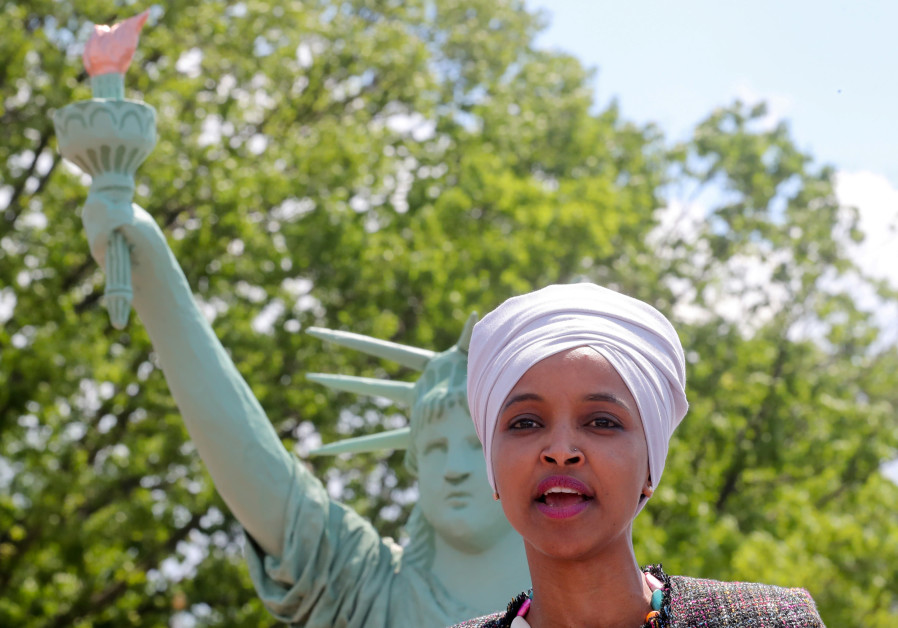Do boycotts mentioned by Ilhan Omar compare to BDS movement? -analysis

U.S. Representative Ilhan Omar (D-MN) addresses a small rally on immigration rights at the temporary installation of a replica of the Statue of Liberty at Union Station in Washington, U.S. May 16, 2019. (photo credit: JONATHAN ERNST / REUTERS)
In submitting House Resolution 496, which affirms “that all Americans have the right to participate in boycotts in pursuit of civil and human rights,” US Rep. Ilhan Omar invoked several previous examples where she says that “boycotts have been effectively used” in the United States and around the world.
“We are introducing a resolution… to really speak about the American values that support and believe in our ability to exercise our first amendment rights in regard to boycotting,” Omar told Al-Monitor in an interview centered on her resolution. “It is an opportunity for us to explain why it is we support a nonviolent movement, which is the BDS movement.”
Do those so-called boycott movements compare to the Boycott, Divestment and Sanctions (BDS) movement, as Omar implied?
The Boston Tea Party – the dumping of 340 chests of British East India Trading Company tea into the Boston Harbor by members of the Sons of Liberty – is considered to have directly led to the American Revolution of 1775. However, the event happened as a result of “taxation without representation” – American colonists believed Britain was unfairly taxing them to pay for expenses incurred during the French and Indian War.
The Montgomery bus boycott was a political and social protest campaign against the policy of racial segregation on Alabama’s public transit system, and the United Farm Workers-led boycott of table grapes was a movement organized by workers who wanted better pay and safer working conditions.
Perhaps the boycott that is most similar is the one against Imperial Japan in 1937 and 1938, a notable expression of activism in the Seattle area and the West Coast. The boycott was led by the Washington Commonwealth Federation (WCF) – a left-leaning coalition of what have been called “Communists and radicals” that worked inside the Democratic Party. They were frustrated by the Japanese Empire’s attack on the Republic of China, which WCF members saw as a defenseless victim of attack. However, the federation’s extensive boycott campaign ultimately hurt local businesses and led to increased discrimination against Japanese Americans in Washington.
Omar claims that the 1930s boycotting of Nazi Germany was in response to the “dehumanization of the Jewish people in the lead-up to the Holocaust.” However, the 1930s boycott by the US of German goods came largely as a result of Germans boycotting Jewish businesses.
In contrast to these examples, Arab citizens of Israel have equal political rights and serve on the Supreme Court and in the Knesset. And, similar to the outcome of the WCF boycott, the BDS movement ultimately harms the people it is trying to help: the Palestinians. This was certainly true in October 2015, when some 500 Palestinians lost their jobs when SodaStream moved its headquarters from the Mishor Adumim industrial park in the West Bank to a new facility in Lehavim, within the Green Line, due to pressure from the BDS movement.
In addition, the BDS movement has been deemed antisemitic and tied to terrorism.
According to the International Holocaust Remembrance Alliance, signaling out Israel is defined as antisemitism.
“You cannot talk about annihilating the State of Israel,” Ron Brummer, director of operations at the Strategic Affairs Ministry, told The Jerusalem Post in a previous interview. “So, BDS is used to cover up the movement’s true face: antisemitism [which is] linked to [terrorism] and denying the mere existence of the State of Israel.”
RECENTLY, THE German Bundestag likewise ruled that BDS is antisemitic and called on governmental bodies not to finance or support any organizations that support BDS or question Israel’s right to exist.
Moreover, more than 30 financial accounts associated with BDS-supporting nonprofits having ties to terrorism or terrorist operatives – 10 of them in the United States – have been closed in the last two years. The announcement of their closure by the Strategic Affairs Ministry came in early June, only months after the ministry published a separate report, “Terrorists in Suits,” which revealed more than 100 links between terrorist groups and organizations promoting boycotts of Israel, including the employment of 30 current and “retired” terrorist operatives.
On the same day that Omar debuted her resolution, the House Foreign Affairs Committee discussed another non-binding resolution explicitly condemning the BDS movement as an attempt to “undermine the two-state solution.” That anti-BDS resolution notes that the movement’s founder, Omar Barghouti, has openly dismissed the possibility of reaching any settlement that allows the State of Israel to retain its sovereignty.
Still, as Omar’s campaign told Muslim Girl after the election, “Ilhan believes in and supports the BDS movement, and has fought to make sure people’s right to support it isn’t criminalized.”
In February, Omar tweeted that “It’s all about the Benjamins baby,” accusing the American-Israel Political Action Committee (AIPAC) of buying influence from US politicians. Soon after, she said that she felt pressured to pledge “allegiance” to Israel, which to many invoked the dual loyalty trope.
In 2012, Omar tweeted that “Israel has hypnotized the world; May Allah awaken the people and help them see the evil doings of Israel.”
As such, “Whereas the Supreme Court has recognized various activities as ‘expressive conduct’ warranting constitutional protection, such as flag burning, wearing black armbands, silent sit-ins and creating and designing custom wedding cakes,” as Omar’s resolution reads, it seems obvious that supporting House Res. 496 would not “preserve the freedom of advocacy for all.” Rather, it would be a move in support of antisemitism and delegitimization of the State of Israel.
Join Jerusalem Post Premium Plus now for just $5 and upgrade your experience with an ads-free website and exclusive content. Click here>>






Comments are closed.